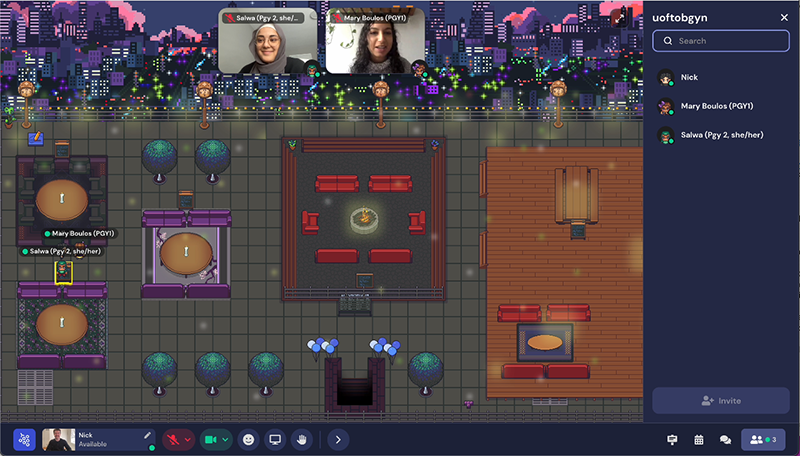Mobile Menu
- Education
- Faculty
- Research
- News & Events
- Divisions
- Equity, Diversity & Inclusion
- About Us

During interviews, a large group of our residents volunteered to host CaRMS candidates in a custom-built virtual Gather space where hopeful trainees could mingle and ask questions, learn more about our program, and break the ice with engaging games and activities.
Organized by residents Dr. Adeolu Banjoko, Dr. Mary Boulos, Dr. Salwa Farooqi, Dr. Jessica Li, Dr. Justin Lim, and Dr. Alex Pittini, the virtual CaRMS Social was attended not only by roughly 30 resident volunteers, but also Department faculty and staff who were keen to meet potential incoming residents and give them a fuller picture of what training at the University of Toronto is like.
“The spirit of the event was to show that U of T is a fun, open space where we welcome all different people from all different walks of life,” Farooqi said. “We wanted to create a comfortable environment and a safe space for everyone to come and get to know the program.”
Using Gather, attendees created digital avatars before exploring a special digital environment set up by our residents with designated areas for candidates to listen to presentations, mingle in small groups, or conduct private conversations.
Different rooms were set up with different themes that might be of interest to the candidates, including transition to residency, living in Toronto, work-life balance, senior residency, extracurricular activities, and global women’s health. To keep the mood light, the residents also offered Toronto-themed trivia and a scavenger-hunt that was a hit with attendees.
Ultimately, residents saw the event an opportunity to showcase the close-knit community feel of the program.
“We wanted them to see the connection the residents have with each other, the connection we have with faculty, and the diversity of the program and our patient population as well,” Boulos said.
“For me, it was just so important for us to really let applicants see the spirit and the culture of our program that we have here.”
As far as the large turnout of volunteers, residents said they were just eager to do what previous generations had done for them.
“The biggest motivating factor for all of us who helped in any capacity was paying it forward,” Farooqi said. “We were very fortunate and blessed to have people in senior years do the same for us.
“The things they said, their words of encouragement, the guidance through residency and applications was what got us here. We wanted to give the same back.”
